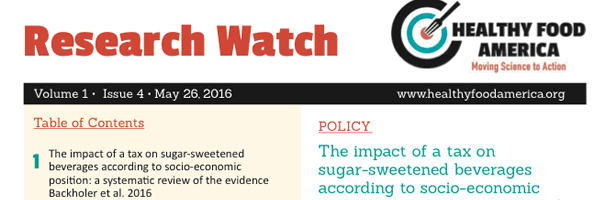Welcome,
Momentum is growing on efforts to rein in sugar across the United States. Last week, Michelle Obama announced that, at long last, federally required nutrition labels will call out added sugar and recommended daily limits. At the same time, the FDA told industry to stop hiding sugar behind terms like “evaporated cane juice”. A judge in San Francisco issued a key ruling in favor of warning labels on outdoor ads for sugary drinks. And the debate in Philadelphia has launched a national conversation over attempts to reclaim revenue from sugary drinks. Read on for more details:
FDA to Industry: Stop hiding behind terms like 'evaporated cane juice'
On the heels of Michele Obama’s announcement that new nutrition labels will include added sugar, the FDA gave new guidance for the food industry on evaporated cane juice. These changes will make it more difficult for marketers to mislead the public about sugar. Although we know much more action is needed to reverse the flood of added sugars, these changes are critical early steps. Read More.
Our Executive Director Jim Krieger on why this is a win
The FDA’s changes will bring added sugar out of hiding and our executive director explains why this long-awaited change represents a real victory for consumers and their health. The science is clear that added sugars, which today appear in 68 percent of packaged food and beverages, are a key contributor to rising rates of diabetes and liver, heart and dental disease. Now families will know what is in the products they buy and the implications for their health. Read More.
Read the latest issue of HFA’s Research Watch

How “regressive” is a sugary drink tax? Our latest issue of Research Watch reports on a review of 11 studies examining who pays and who benefits that found any regressive impact was equivalent to less than $5 per household per year, while low-income families received the greater benefit. See more in our our monthly summary of important research findings on the impacts of sugar on health, and related policy. We hope Research Watch will help you stay on top of this rapidly developing body of knowledge and inform your strategic thinking, communications and advocacy work. Read More.
Reclaiming revenue from sugary drinks is an idea whose time has come
At the moment, all eyes are on Philadelphia, where the City Council is meant to adopt a budget – with or without the tax – by July 1. Debate over the merits of using a sugar tax similar to those on tobacco is getting a flurry of both national and local coverage. We look at some of the most compelling arguments around this issue. Read More.
Bay Area vs. Big Soda heats up

California’s Bay Area has been an epicenter of action lately in reducing consumption of sugary drinks. A federal judge ruled that San Francisco could proceed with requiring warning labels on soda ads and the East Bay city of Albany added a proposed sugary drinks tax to the November ballot. Neighboring Oakland will let voters decide this November whether to follow Berkeley's example with a penny per ounce tax on sugary drinks and a similar effort is likely to hit the ballot in San Francisco. Read More.
Please share on Twitter:
Hope you’ll join the movement & help us knock sugar back to healthy levels!
Sign up at http://www.healthyfoodamerica.org pic.twitter.com/7rJJ5Ic4fB
Facebook sample post:
Hope you’ll join the movement & help us knock sugar back to healthy levels!
Sign up at http://www.healthyfoodamerica.org
Continue the Discussion |
We'd love to hear from you!
Please take a minute to give us some feedback to make this as useful as possible. If you have tips on research we should cover, please send them to Petra Vallila-Buchman at [email protected]. You can also follow us on Facebook and Twitter @HealthyFA.
Please forward Research Watch to any colleagues you think might be interested.
Was this forwarded to you? Sign up here to receive future editions.
Yours Truly,
David Goldberg
Healthy Food America


